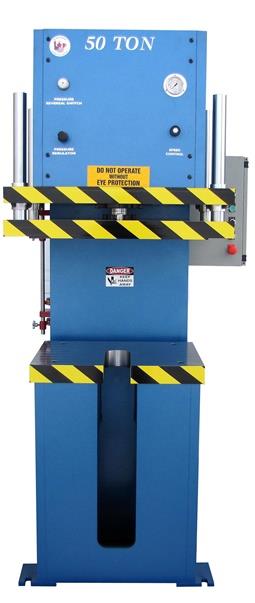When it comes to addressing common issues associated with an hydraulic shop press, the second most common cause of failure is overheating. The number one cause of hydraulic system failure is the existence of leaks. With leaks the dynamic involved in easy to understand, unlike that of overheating. Because overheating can be the result of a number of different issues, it can be difficult to understand and diagnose. Taking the time to understand the common causes of overheating with an hydraulic press will go a long way in preventing it.
What Causes the Overheating of Hydraulic Equipment?
The heating of hydraulic fluid is the direct result of certain inefficiencies in the equipment. It is these inefficiencies that create a loss of input power, ultimately resulting in the loss being converted to heat. Overheating occurs when the total input power that is lost to heat is greater than the rate at which the heat is dissipated. In other words, heat is being generated at a faster rate than it is dissipating. This is the direct result of a system that is not functioning optimally. When addressing issues with equipment inefficiencies, one of the first steps is to ensure equipment quality. The best way to ensure that you have a quality hydraulic press is to purchase it from a company such as Press Master. Press Master has a long history of providing only the best in hydraulic presses.
The Proper Temperature of Hydraulic Fluid
It is important to understand the heat threshold when it comes to hydraulic fluid. When the temperature of the fluid exceeds 180 degrees F, it has the potential to damage the seal compounds which can lead to leaks, it can also impact the viscosity of the fluid, leading to oil degradation. As this process continues, the equipment will continue to lose it effectiveness, further increasing the risk of overheating. As the viscosity of the fluid continues to decline its ability to properly protect against heat created by friction will dissipate, further exacerbating the overheating issue.
Properly Maintaining a Safe and Stable Hydraulic Fluid Temperature
In order to maintain a stable fluid temperature, the system must be functioning at a level that provides the capacity to dissipate heat at a rate that exceeds the heat load that is being created. A system that is generating a consistent input power of at least 100 kw and performing at an efficiency rate of 80 percent would have to have the capacity to dissipate a heat load of at least 20 kw.Equipment that has a cooling system that is designed with a cooling capacity of 25 kw would be compromised if anything caused the system to produce heat at a rate higher than 25 kw or causes the cooling capacity to be reduced below 25 kw.In simple the best way to maintain a stable hydraulic fluid temperature is to ensure that the hydraulic press is properly maintained and the fluid is changed at regular intervals. The more efficient the hydraulic shop press the less issues that you will have with the hydraulic system overheating.
In the market for a hydraulic press? Call us here at Press Master today. We’re happy to answer your questions about our wide range of hydraulic presses, and we can provide you with a free, no-obligation quote.

